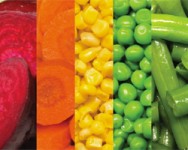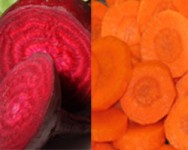Sorry. Online registration has closed.
Sorry. Online registration has closed.
NYS Processing Vegetable Industry Roundtable Meeting
Processing vegetable industry members who grow, manage, or support crop production for Nortera, Seneca Foods and/or Love Beets, should attend this roundtable meeting. Attendees that stay for the full day will:
- Network at this in-person meeting.
- Learn the results of industry-funded research.
- Have a voice in Cornell research and extension.
- Earn 4.0 DEC pesticide applicator and 5.0 CCA recertification credits
This FREE event includes lunch! For more information about this meeting, email Julie Kikkert or call 585-313-8160.
Event Details
Date
March 15, 2023
Time
9:00 am - 12:15 pm
Location
First United Methodist Church
8221 Lewiston Rd (Route 63)
Batavia, NY 14020
Cost
FREE!
This FREE event includes lunch immediately following the Morning Session.
Host
Cornell Vegetable ProgramJulie Kikkert
585-313-8160
email Julie Kikkert
Morning Session: All Processing Crops

MORNING SESSION AGENDA (9:00 am - 12:15 pm)
Registration and Sign-Up for DEC and CCA credits for AM Session (2.0 DEC credits in categories 1a, 10, 23, and 3.0 CCA recertification credits)
Welcome - Julie Kikkert, CCE Cornell Vegetable Program
Industry Roundtable - Moderated by Stephen Reiners, Cornell
Corn Earworm Monitoring and Control in Sweet Corn, and Snap Bean Seed Treatments for Better Insect Control - Brian Nault, Cornell
Nitrogen on Snap Beans - Is More Better? - Stephen Reiners, Cornell
What's all the Squawking About? Data from Laser Scarecrows and Bird Gard Devices in Processing Sweet Corn Fields - Julie Kikkert, CCE Cornell Vegetable Program
Drone-based Precision Agriculture: An Update on Harvest Scheduling and Yield & Disease Forecasting on Beans and Beets - Jan van Aardt, Rochester Institute of Technology
Weed Management Updates: Regulatory Issues and Novel Weed Control Technology on the Horizon - Lynn Sosnoskie, Cornell
ADJOURN Morning Session and distribute DEC credit sheets
This FREE event includes lunch immediately following the Morning Session. Register now to guarantee lunch.
LUNCH BREAK & NETWORKING (12:15 PM to 1:00 PM)
Event Details
Date
March 15, 2023
Time
12:15 pm - 1:00 pm
Cost
FREE!
Lunch is provided to anyone attending either the Morning or the Afternoon Session. Registration required.
Host
Cornell Vegetable ProgramJulie Kikkert
585-313-8160
email Julie Kikkert
Lunch Break and Networking
Lunch is FREE to anyone attending either the Morning Session or the Afternoon Session of the NYS Processing Vegetable Industry Roundtable Meeting. Registration is required.
Event Details
Date
March 15, 2023
Time
1:00 pm - 3:00 pm
Location
First United Methodist Church
8221 Lewiston Rd (Route 63)
Batavia, NY 14020
Cost
FREE!
This FREE event includes lunch preceding this session (at 12:15 pm).
Host
Cornell Vegetable ProgramJulie Kikkert
585-313-8160
email Julie Kikkert
Afternoon Session: Beets and Carrots

LUNCH
BREAK & NETWORKING (12:15 PM to 1:00 PM)
AFTERNOON SESSION AGENDA (1:00 PM to 3:00 PM)
Sign-Up for DEC and CCA credits for PM Session (2.0 DEC credits in categories 1a, 10, 23, and 2.0 CCA recertification credits)
Beet and Carrot Roundtable - Moderated by Stephen Reiners, Cornell.
Results of Electrical Weeding in Beets and Other Weed Management Topics for Beet/Carrot Growers - Lynn Sosnoskie, Cornell
Potential for Gibberellic Acid 3 to Manipulate Table Beet and Carrot Growth and Yield - Sarah Pethybridge, Cornell
Optimizing Control of Cercospora Leaf Spot with Improved Scouting and Disease Forecasting - Sarah Pethybridge, Cornell
Wrap-up Discussion - Moderated by Julie Kikkert, CCE Cornell Vegetable Program
ADJOURN Afternoon Session and distribute DEC credit sheets

Upcoming Events
African Eggplant Participatory Breeding Kick-Off
March 5, 2026
Join us to learn about the Cornell African Eggplant Research Project and learn how you can participate! African eggplant, also known as Bitterball, Garden Egg, Kittley and other names, is an important crop for many members of our community with heritage from regions such as sub-Saharan Africa, Southeast Asia, and Brazil. Since 2024, the Cornell African Eggplant Research Project has been collaborating with growers and community partners across New York to develop high-quality varieties adapted to the Northeast U.S. In this meeting, we will share information about growing and preparing African eggplant, highlight our research to date, and invite partners to collaborate with us in our 2026 participatory breeding and variety selection efforts.
COST: FREE! You must pre-register to receive the Zoom link.
Managing the Invasive Swede Midge Webinar
March 6, 2026
Swede midge is an invasive fly that causes serious economic losses to brassica crops. Due to its small size and hidden feeding habits, swede midge is often called an "invisible pest" and damage may be misdiagnosed. In this webinar, we will review the swede midge life cycle and crop damage symptoms, current management recommendations, new research findings, and highlights from on-farm case studies with a focus on organic management.
1.75 DEC pesticide recertification credits in categories 1a, 10, and 23.
Good Agricultural Practices (GAPs) Food Safety Training
March 10, 2026
Newark, NY
Learn about food safety on the farm! This event hosted by the Cornell Vegetable Program, Cornell Lake Ontario Fruit Team, CCE Wayne County, and the NYS Department of Agriculture, will cover good agricultural practices (GAPs) to help reduce the risk of microbial contamination on the farm, keeping food and consumers safe.


































